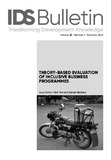Assessing Contributions Collaboratively: Using Process Tracing to Capture Crowding In
| dc.contributor.author | Faling, Marijn | |
| dc.date.accessioned | 2022-02-01T15:32:22Z | |
| dc.date.available | 2022-02-01T15:32:22Z | |
| dc.date.issued | 2022-02-01 | |
| dc.identifier.citation | Faling, M. (2022) 'Assessing Contributions Collaboratively: Using Process Tracing to Capture Crowding In' in Ton, G. and Vellema, S. (Eds) Theory-Based Evaluation of Inclusive Business Programmes, IDS Bulletin 53.1, Brighton: IDS | en |
| dc.identifier.uri | https://opendocs.ids.ac.uk/opendocs/handle/20.500.12413/17101 | |
| dc.description.abstract | If inclusive business is to realise wide and sustained development impacts, it is likely to depend on crowding in of other public and private actors. Assessing the contribution of inclusive business to crowding in is difficult because the phenomenon usually only manifests after project completion, and the complex operating environment complicates the process of evidencing a link between intervention and outcome. With donors placing increasing emphasis on demonstrating impact, innovative approaches to assess crowding in are needed. This article presents an adapted form of process tracing to assess the contribution of inclusive business to crowding in. It reports on the contribution of CREATE, an inclusive agribusiness project, to the crowding in of malting companies in Ethiopia’s barley value chain. Though predominantly focusing on demonstrating a programme’s contributions to crowding in, the article offers suggestions for how this process tracing-based exercise may support the fostering of inclusive agribusiness practices more broadly. | en |
| dc.language.iso | en | en |
| dc.publisher | Institute of Development Studies | en |
| dc.relation.ispartofseries | IDS Bulletin;53.1 | |
| dc.rights | This is an Open Access journal distributed under the terms of the Creative Commons Attribution Non Commercial 4.0 International licence (CC BY-NC), which permits use, distribution and reproduction in any medium, provided the original authors and source are credited, any modifications or adaptations are indicated, and the work is not used for commercial purposes. http://creativecommons.org/licenses/by-nc/4.0/legalcode | en |
| dc.rights.uri | http://creativecommons.org/licenses/by-nc/4.0/ | en |
| dc.subject | Development Policy | en |
| dc.title | Assessing Contributions Collaboratively: Using Process Tracing to Capture Crowding In | en |
| dc.type | Article | en |
| dc.rights.holder | Institute of Development Studies | en |
| dc.identifier.team | Rural Futures | en |
| dc.identifier.doi | 10.19088/1968-2022.108 | |
| dcterms.dateAccepted | 2022-02-01 | |
| rioxxterms.funder | Default funder | en |
| rioxxterms.identifier.project | Default project | en |
| rioxxterms.version | VoR | en |
| rioxxterms.funder.project | 9ce4e4dc-26e9-4d78-96e9-15e4dcac0642 | en |
Files in this item
This item appears in the following Collection(s)
Except where otherwise noted, this item's license is described as This is an Open Access journal distributed under the terms of the Creative Commons Attribution Non Commercial 4.0 International licence (CC BY-NC), which permits use, distribution and reproduction in any medium, provided the original authors and source are credited, any modifications or adaptations are indicated, and the work is not used for commercial purposes. http://creativecommons.org/licenses/by-nc/4.0/legalcode


